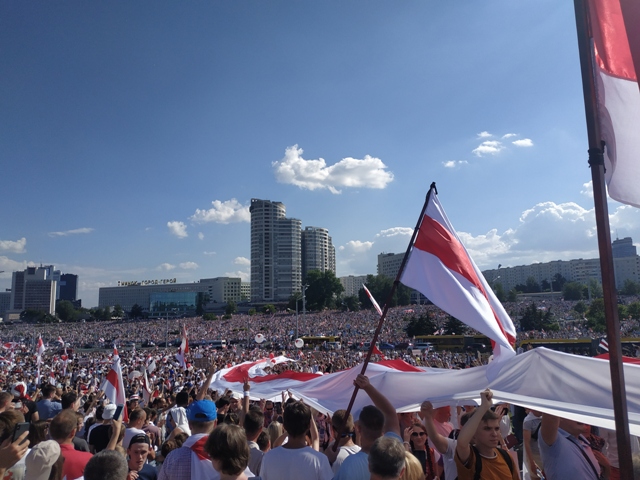Belarus urged to end systematic repression and release political detainees
The report draws on interviews with 207 victims and witnesses and an analysis of over 2,500 items of evidence, including photographs, videos, medical and court records.

UN High Commissioner for Human Rights Volker Türk has urged the Government of Belarus to end the systematic repression of perceived critics and immediately release all detainees held on political grounds, in a UN Human Rights Office report published today that concludes gross human rights violations are being committed across the country.
The report draws on interviews with 207 victims and witnesses and an analysis of over 2,500 items of evidence, including photographs, videos, medical and court records.
It documents widespread and systematic violations of international human rights law, including unlawful deprivation of life and numerous cases of arbitrary deprivation of liberty, torture and ill-treatment, as well as sexual and gender-based violence, violations of the rights to freedom of expression, peaceful assembly and association, and the denial of due process and equal protection of the law.
“Our report paints an unacceptable picture of impunity and the near-total destruction of civic space and fundamental freedoms in Belarus,” Türk said. “The Government owes it to its people to bring a halt to this mass repression and to conduct impartial and transparent investigations to ensure that those responsible for grave violations are held accountable.”
The report details the findings of the Office’s examination of the human rights situation in Belarus, mandated by the UN Human Rights Council, and covers the period from 1 May 2020 to 31 December 2022.
Violations appear to have been part of a campaign of violence and repression intentionally directed at those who were – or were perceived to be – opposing the Government or had expressed critical views, the report says. The report considers that some of these violations may amount to crimes against humanity.
The beating of thousands of peaceful protesters in the immediate aftermath of disputed elections, from 9 to 14 August 2020, was approved at a high level within Government, coordinated and openly incited, the report finds. The examination also finds reasonable grounds to believe that unnecessary and disproportionate force was used against demonstrators and detainees, resulting in at least five deaths.
“Given the widespread unlawful use of force, the widespread and systematic practice of torture and inhuman treatment, including denial of medical care, and the overall situation of impunity, the actual death toll during the protests and related arrests may have been higher and further investigation would be required,” the report notes.
The UN Human Rights Office collected dozens of first-hand accounts of torture and found hundreds of complaints to be credible. It also documented over 100 cases of sexual and gender-based violence against detainees. But the scale of sexual and gender-based violations and abuses is likely to be under-reported due to stigma, fear of reprisals and denial of access of UN Human Rights investigators to the country.
Severe sentences passed by the courts are illustrative of the instrumentalization and abuse of the justice system against opposition figures, bloggers, journalists, human rights defenders, trade union activists and lawyers, the report states.
More than a dozen legislative amendments have been passed since 2021 targeting political activists and opponents, facilitating practices such as trials in absentia, revocation of citizenship and confiscation of private property. In addition, the scope of the death penalty has been expanded. The signature into law on 9 March of provisions authorising the death penalty for civil servants and army personnel convicted of “high treason” further illustrates the extent of repression that is being pursued.
“The appalling practice of pursuing and punishing people for carrying out legitimate human rights work continues,” said Türk, noting the long prison sentences handed down in recent weeks, including against opposition leaders Sviatlana Tsikhanouskaya and Pavel Latushko; Nobel Peace Prize laureate Ales Bialiatski and three other members of the Viasna human rights centre; journalist Andrzej Poczobut; and 10 members of the Workers Movement "Rabochy Rukh".
As of 17 March, 1,462 people are in detention in Belarus on politically motivated charges.
By February 2023, the authorities had shut down 797 NGOs, while 432 others had closed to avoid potential prosecution – figures that account for virtually all the human rights groups working in the country. Most independent Belarusian media outlets have been forced to close – with some declared “extremist“ – along with, recently, the Belarusian Association of Journalists (BAJ).
“It is disgraceful that Belarus authorities are determined to pursue those convicted of so-called ‘extremist activities’ and even go so far as to strip them of their citizenship. Such arbitrary deprivation of nationality will in some cases risk rendering a person stateless,” the High Commissioner said.
While the primary responsibility to address human rights violations remains with Belarus, the report urges UN Member States to consider working towards accountability through national proceedings based on accepted principles of extraterritorial and universal jurisdiction.
- READ MORE ON:
- Belarus
- Volker Türk










